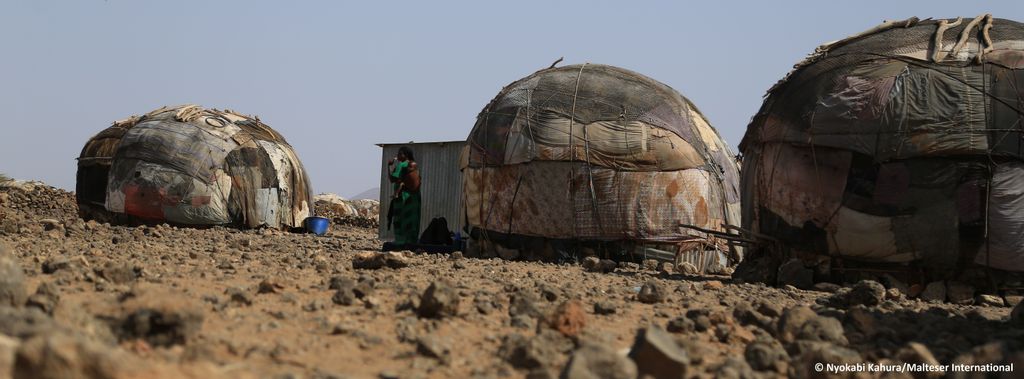
This project has been completed.
Climate Change Adaptation in Kenya
Located in the northern Kenyan county of Marsabit, the regions of Illeret and Hurri Hills are characterized by low rainfall, periodical droughts, sandy soils, and sparsely vegetated land. Since rainfall in these regions is very low, cultivation is almost impossible. Hence, livestock farming serves as a means of livelihood for the mostly nomadic people who live here. Water is also very scarce in both regions.
The difference in the altitude of Illeret (400m) and Hurri Hills (1,500m), however, means that the two regions enjoy different climate conditions. While Illeret remains dry for the most part of the year with hardly any vegetation, the climate in Hurri Hills is colder and allows for cultivation and cattle rearing. Yet, recurrent wildfires and uncontrolled deforestation since the 1950s have significantly reduced forest land. Today, the past glory of the legendary forest is only evidenced in the local name "Badha Hurri", which loosely translates as Cloud Forest.
Recurring droughts have exceeded the adaptive capacity of the semi-nomads living in northern Kenya. In addition to being one of the most marginalized groups in the country, the semi-nomads have also felt the negative impacts of climate change. Hurri Hills and Illeret have been especially affected by water shortages, making cultivation almost impossible.
The problems faced by the local population are not only due to the difficult water situation. The lack of awareness on the sustainable management of natural resources, evidenced through uncontrolled deforestation and overgrazing, is also an important consideration. This has led to further destruction of an already fragile ecosystem.
Through our work in the region, we seek to prepare the semi-nomads for the impacts of climate change by adapting water supply, and secondly, increase their awareness for natural resources by promoting the preservation of local tree species on pilot areas of land as a contribution to climate protection. This is intended to curb deforestation, limit overgrazing and, ultimately, safeguard the biodiversity of the region.
The project targets the semi-nomadic groups of Hurri Hills and Illeret in Kenya's Marsabit County. Through various activities, a total of 2,330 households, which amounts to about 13,380 people or 83% of the total population of both regions, are being supported by the project. Although, in individual cases, active households can enjoy multiple benefits, there is a general focus on particularly disadvantaged households, such as single mothers, families with undernourished or malnourished children or large number of children.
- Sensitization of the local population through trainings and campaigns on issues relating to climate change and the sustainable use of natural resources, thus lying the foundation for the lasting success of the project.
- Strengthening the resilience of households to drought by increasing water storage capacities and adaping supply of industrial and drinking water to climate change.
- Contribution to climate protection by planting trees on three plots of land, and introduction of cooking stoves that enable a more efficient use of energy.
Country info
Capital: Nairobi
Area: 582.650 km²
Population: approx. 53.8 million
Project data
Financing: German Federal Ministry for Economic Cooperation and Development (BMZ)
Partners: Pastoralist Community Initiative and Development Assistance (PACIDA)








